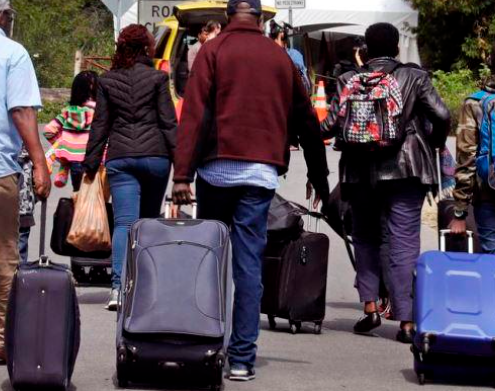
From N60 Million Mansion to a Single Room in the UK: Nigerian Man’s Bold Leap Sparks Nationwide Debate

A Nigerian man’s life-changing decision to sell his Lagos home for N60 million and relocate to the United Kingdom with his two children has ignited widespread debate across social media, unearthing deep questions about sacrifice, migration, and the true cost of a better future. The man, whose identity has not been officially disclosed, reportedly owned a comfortable house in Lagos—one many Nigerians would consider the pinnacle of personal success. Yet, he willingly traded it all for a modest one-room apartment abroad, choosing uncertainty over familiarity, and long-term possibilities over short-term comfort.
The story first gained traction after a neighbour in Lagos shared that the man had quietly put his house up for sale earlier in the year. At the time, few people understood why someone with a seemingly stable life and decent standard of living would decide to take such a drastic step. But by the time he and his children boarded a flight to the UK, his intentions became clearer. Friends said he confided only in a select few, revealing his fears about raising his children in what he described as an increasingly unpredictable environment. For him, relocation wasn’t a luxury—it was a necessity rooted in the hope for a safer and more secure future.
When he arrived in the UK, however, the reality that awaited him was far from glamorous. According to sources familiar with his journey, the man could only afford a single-room apartment in a shared housing arrangement, a far cry from the spacious comfort he once enjoyed in Lagos. In the UK, high rent prices, strict tenancy regulations, and the general cost of living pushed him into a tight corner, making the transition more emotionally and financially demanding than he had imagined. For many Nigerians following the story, the idea of leaving a full house in Lagos only to squeeze into a tiny room abroad feels like a downgrade, yet for others, it represents a strategic move toward long-term stability.
Neighbors back home remember his Lagos home as a well-kept building in a peaceful area, purchased and furnished through years of hard work. Selling it for N60 million was not a decision made lightly. But for him, the choice was never about material comfort. According to acquaintances, he believed that opportunities in education, healthcare, and social mobility in the UK would give his children access to a future he didn’t think Nigeria could guarantee. As he once allegedly told a close friend, “A house can be rebuilt, but a child’s future cannot be replaced.”
The decision mirrors the growing trend of skilled and middle-class Nigerians leaving the country in what has been popularly termed the “japa wave.” Over the last few years, the desire for stability, security, and economic opportunity has pushed thousands to migrate—even when it means starting from scratch. Many Nigerians abroad have shared similar experiences of living humbly while working multiple jobs to rebuild their lives. This man’s case has now become another symbol of the sacrifices people are willing to make, often trading comfort for potential growth.
In the UK, reports say he immediately began taking up menial jobs while enrolling his children in school. Their one-room apartment, while cramped, has become a temporary stepping stone rather than a final destination. A family friend who visited described the space as “bare but full of hope,” explaining that although the room could barely fit three people, the children appeared happier than expected, adjusting quickly to their new environment. The school system, though strict, offered them resources and learning opportunities they might not have had access to in Nigeria.
However, his story has stirred intense reactions online. Some Nigerians admire his bravery, calling him a visionary who prioritized his children’s future over personal comfort. They argue that what truly matters is not the size of one’s living space but the possibilities that surround it. They point out that many migrants begin their lives abroad in small rooms, shared apartments, or even hostels before eventually securing better housing. For them, his one-room apartment is simply the first chapter of a longer, more promising story.
On the other hand, critics argue that the move was unnecessary and even foolish. They insist that N60 million could have been invested in Nigeria, generating income while still providing a stable life for his family. To them, abandoning a comfortable home in Lagos only to live in cramped quarters in the UK shows a misunderstanding of both countries’ socio-economic systems. Some online users expressed shock at the idea of squeezing two children into a single room, calling it a downgrade that might affect the family’s emotional wellbeing. They questioned whether the goals he seeks abroad couldn’t have been achieved through strategic planning within Nigeria.
Still, migration experts say this story reflects a deeper reality: people are driven not just by money or lifestyle but by psychological safety and predictable systems. Many Nigerians who leave the country cite chronic instability, insecurity, and limited opportunities as their primary reasons. Even those who appear to be financially comfortable often feel uncertain about the future, especially concerning their children. For many, the hope of raising children in a society with better healthcare, access to social services, and clearer career pathways is worth far more than any house back home.
As discussions continue, this man’s experience serves as a reminder that migration stories are rarely straight lines. They are filled with sacrifice, humility, setbacks, and long-term vision. He may be living in a one-room apartment today, but many Nigerians see this phase as merely temporary. Once he stabilizes his income, adjusts to the UK work system, and secures better housing, the foundation he is building for his children may prove far more valuable than the walls he left behind in Lagos.
His story has now become a powerful symbol of both the struggle and the resilience of the Nigerian spirit. It raises questions about what people are willing to give up for a chance at stability and a future filled with possibility. Whether one sees his choice as courageous or misguided largely depends on personal experiences and expectations. But what cannot be denied is that he made a deliberate, heartfelt decision for the sake of his children—one that many parents around the world can relate to, even if they would never make the same choice.
From a N60 million house in Lagos to a single room in the United Kingdom, his journey is a poignant reminder that home is not just where we live—it is where we believe our children can truly thrive.


